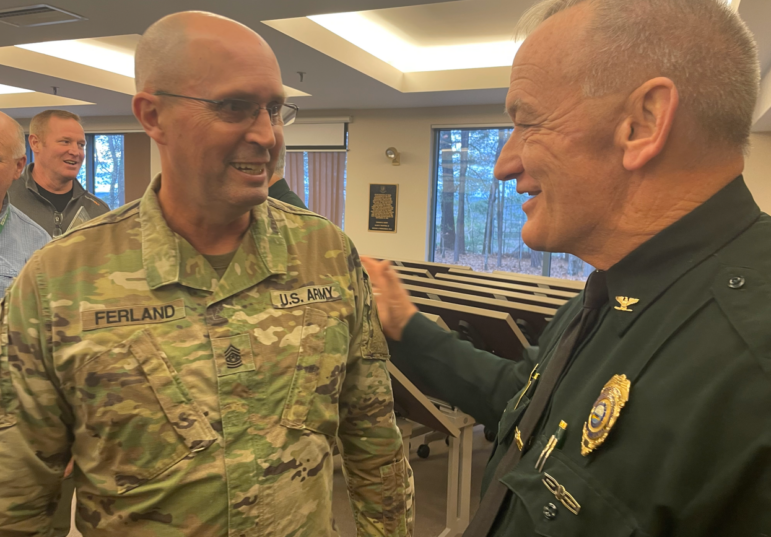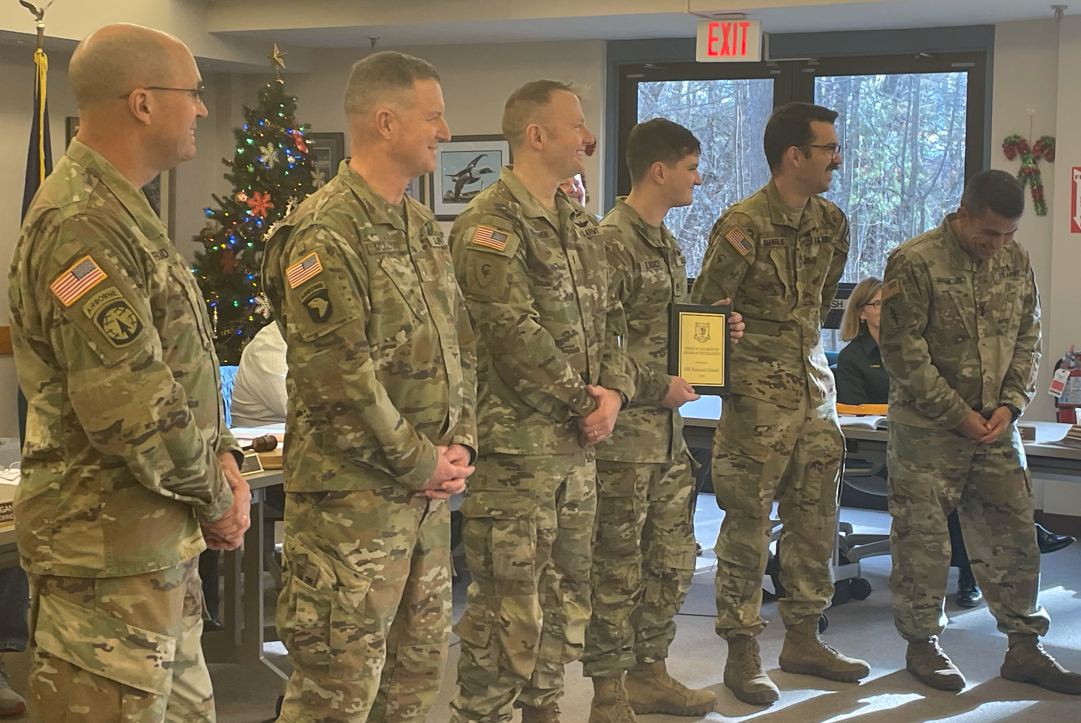
Above, Command Sgt. Major William M. Ferland, left, is congratulated by New Hampshire Fish and Game Col. Kevin Jordan Tuesday. Paula Tracy photo
By PAULA TRACY, InDepthNH.org
CONCORD – Only hours after they rescued five people from their roofs in Conway as the rising waters of the Saco River threatened their lives, members of the New Hampshire Army National Guard were honored by the state’s Fish and Game Commission Tuesday.
The annual Search and Rescue Volunteer Award was given to guard members for their efforts to save lives, while never sending a bill to the state of New Hampshire.
They attended an awards ceremony at the beginning of the Commission’s regular monthly meeting at Fish and Game Headquarters in Concord Tuesday just as the rivers of the state began to recede from in some cases almost five inches of rain Sunday into Monday.
The nomination came from Chris Thayer of the New Hampshire Outdoors Council who is White Mountain facilities director of the Appalachian Mountain Club. The AMC operates a series of high mountain huts and sometimes sees those in danger.
“It was an easy nomination,” said Thayer. “New Hampshire has a very strong public-private partnership when it comes to search and rescues, grounded by of course New Hampshire Fish and Game Department conservation officers but backed up, ably, by the New Hampshire National Guard and dozens of other teams.”
Col. Kevin Jordan said the guard works solidly with the department to save lives and on average is asked to help about eight times a year in the woods and mountains.
He said just that very day, Conway Fire Chief Steve Solomon was trying to evacuate residents of a trailer park near the Saco River during the rain event Monday that caused flooding in the area but there was a group of about six elderly residents who refused to leave their home.
As the flooding increased, those individuals had to get on their roofs and were asking for help from the rising and rushing water.
Jordan said the department responded with a swift water rescue team but in the end, it was the Blackhawk that was able to save four of the six.
“In the heat of the storm you can’t fly,” he said. “But the Guard actually got a window and were able to fly four of them off. And then they couldn’t get the rest,” he said. “The other two, they had to wait for the waters to subside and the swift water rescue teams went back in and got the other two.”
“It was a little touch and go for a while,” Jordan said, but all were saved.
The state is in debt to the guard for its efforts which save lives and doesn’t cost the state, he said.
“To fly a Blackhawk helicopter is incredibly expensive. The state of New Hampshire – my budget certainly – wouldn’t support the use of that resource. Without that resource we would literally lose lives. I call that helicopter when people are near death in some of the more difficult and dangerous sites, where you are putting people in extreme risk. They will fly in there and pick these people up,” he said.
The guard submits that cost and finds a way to absorb it, he said.
Jordan said he has been told that when these citizen soldiers are deployed, they are often chosen to handle some of the more difficult mountain missions in a Blackhawk because of their experience here.
He said the state has never billed for a Blackhawk rescue though it continues to bill unprepared hikers for their rescues on the ground.
Fortunately, the public has stepped up and voluntarily purchased Hike Safe cards which help support rescue efforts and right now the fund is doing fairly well.
“We are in a lot better shape today than we were 10 years ago,” he said. “People are tremendous,” he said in voluntarily paying it forward with these cards.
The department handles about 200 rescues a year and about 10 people on average are charged for their rescues due to negligence. That number has not changed, he said.
Attending the ceremony was Major General David J. Mikolaities, the adjutant general who has served in that capacity since 2017 and about eight of his members.
He attended with the crew who were working until after 2 a.m. Tuesday to save the citizens of Conway.
NEW DIRECTOR TO BE SOUGHT
Meggan Hodgson, Rockingham County Commissioner said she will chair a search committee beginning in January for a replacement for Executive Director Scott Mason who is stepping down when his term ends in August, 2024.
She said there would be full transparency “as possible” among the subcommittee and full commission. She said the subcommittee was having a meeting with the attorney general to launch the process later Tuesday in a non-public session.
The law requires the commission to nominate someone to the governor and the governor can then accept or reject the nomination, but the governor cannot nominate an individual on his own like he can other department heads.
LEGISLATION
The Commission was asked to endorse 38 legislative bills which are coming up this coming legislative session which begins in January.
But some members of the public, and one bill sponsor expressed concern that there were not more minds on the committees that were related to non-consumptive use of Fish and Game.
Most of the Fish and Game related bills will be opposed by the commission they agreed in mostly unanimous votes.
It agreed to support HB 1002 relative to fees to access the right-to-know law and HB 1304 relative to marine decal fees. It also voted to support HB 1138 relative to fines on OHRV while the driver was suspended.
But it opposed the following bills: one related to coyotes in HB 1100; and on pistols permitted to take game in House Bill 1424; HB 1116 relative to types of weapons used for taking game. Also on cyanobacteria in HB 1143; HB 1148 relative to the Fish and Game Commission and allowing various organizations to nominate non-consumptive use members; CACR 1515 relating to taxation; 1558 relative to licenses; HB 1024 relative to use of air rifles for hunting game; HB 1026 relative to resisting arrest; HB 1029 relative to exempting certain people in obtaining lobster licenses; HB 1069 relative to disclosure under right-to-know law; HB 1417, relative to wild trout management; HB 1420 relative to communications between agencies and citizens; HB 1325 relative to kangaroos and other animals; HB 1532 relative to landowner rights on game cameras; HB 1530 relative to requiring conservation officers wear body cameras; HB 1121 relative to creating wetlands permit exemptions after a major weather event; HB 1527 relative to criminal trespass; HB 1521 relative to issues in rulemaking process; and HB 1228 relative to establishing a Fish and Game guide committee.
Also opposed were HB 1494 relative to OHRVs; HB 1503 relative to the definition of wetlands; HB 1484 relative to current use taxation; SB 336; SB 542 relative to appointments to the Fish and Game Commission; SB 309 relative to defining critical habitat, contrary to the recommendation of Fish and Game staff recommendation; SB 533 relative to quorums; and SB 548 removing squirrels from the definition of game animals.
It also opposed SB 346 relative to hounding with dogs and HB 1697 relative to suspending the state’s participation in emissions reductions.
It voted, however, to support SB 503, relative to requiring a criminal background check for guides; and SB 310 relative to bear registration.
State Rep. Cathryn Harvey, D-Spofford sponsor of HB 1148 said she was very disappointed by the commission’s opposition and said she is certainly willing to amend the bill concerning the posting of the nominees for commissioner.
She also said it is the job of the commission to set seasons and rules.
“I agree,” Harvey said. “That is your job. But I also know there is constant criticism that citizens are not represented on these boards,” noting non-consumptive users of Fish and Game should have a voice.
“I really felt my bill went a long way on this dilemma.” It allows participating organizations to nominate a name. It doesn’t require approval.
Two years ago, a similar bill was supported by the commission.
“Let’s fix it now,” Harvey said.
Kristina Snyder agreed and asked them to reconsider that position. She said, “we need a different outlook.”
Linda Dionne said she agreed with Snyder and said it appears there was no input from the public on weighing in on bills.
“You are all hunters and fishers,” she said.
“That’s what they do, they kill the coyotes and leave them,” she said. She asked them to reconsider.
“You don’t engage the public,” she said.
There is no requirement for public input at the Fish and Game subcommittee, Rep. Harvey said.
Julia Sinclair of Newmarket said while everyone is going along with the rules, the commission needs to think about what their communities want to do overall.
Dionne said there have been times in the past when the subcommittee did allow public input.
Commissioner Hodgson said she is Dionne’s constituent, and she would like to get a call from her and share that information with the commission.
HATCHERY UPDATE
An update on the state fish hatchery construction project was given to the commission as all the state’s aging hatcheries need to be replaced.
Dianne Timmins, for the department, said the Executive Council just approved $7.5 million in federal funds for engineering for a New Hampton fish hatchery. An overhaul which is expected to cost $47 million will be complete in 2025.
None of the facilities will be closed but none have the ability for re-use.
She said they are in some cases 100 years old.
“The staff is just excited,” Timmins said, to begin to fix the New Hampton facility.
The matter came to a head following litigation, but the concern is whether the state will be able to still produce the same amount of fish to stock lakes and water bodies for anglers.
The total pounds of fish total that they do produce is 358,000 and proposed during construction is 362,000 pounds yield, throughout the state.
The total pounds of fish produced at the Powder Mill hatchery in New Durham will be reduced the most to meet federal EPA guidelines.
It will go from 124,000 existing pounds to 30,000.
The hatchery at Berlin will see little change; 74,226 existing to a proposed 64,336.
New Hampton will see a large increase going from 71,792 pounds to 150,000.
Milford generates 68,124 pounds and will remain the same. Twin Mountain and Warren hatcheries will see about the same production level.
“We believe we will be able to raise the same number of fish for anglers…and maintain egg production solely at New Hampton,” said Executive Director Scott Mason.





